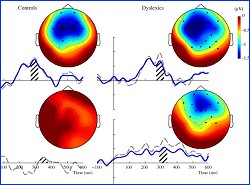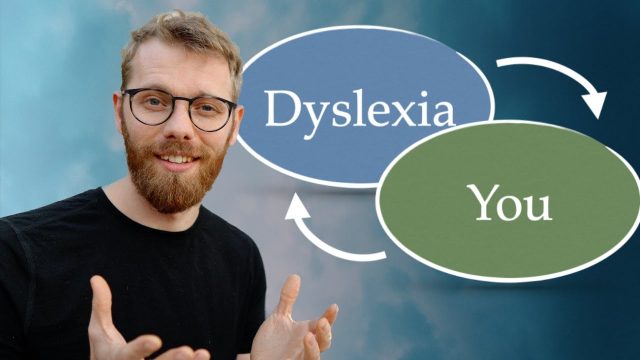Allophonic Processing & Dyslexia – A Research Update
New research among dyslexic adults seems to confirm that dyslexics have a heightened sensitivity to sounds of language, thinking in an allophonic mode rather than focusing on phonemic units. Allophones are the smallest units of sounds that can be discerned in language; phonemes are made up of groups of allophones that have linguistic significance. For example, the /th/ sound is softer as pronounced in the word “this” than in different in the word “thick,” but both sounds are always spelled with the same letter combination in English.
An allophonic perceptual mode would mean that dyslexics are sensitive to phonetic variations that are irrelevant to understanding or writing their language. To explore this possibility, researchers used EEG to measure the mental response of adult dyslexics and control subjects while listening to sounds along the /bə – də/ continuum. Both groups showed similar brain wave activity when listening to different phonemes, but only the dyslexic listeners showed a continued mismatch negativity response when listening to different sound within the same phonemic category.
A “mismatch negativity” response is a brain wave spike triggered when a person perceives an auditory change. In this study the brain wave evidence confirms that dyslexic listeners hear more rather than less when attending to the sounds of language. This explains why dyslexics commonly have difficulties with reading and spelling, but suggests that remedial instruction to teach letter / sound correspondence may be on the wrong track and potentially add to a student’s confusion.
Research Citation:
Mark W. Noordenbos, Eliane Segers, Willy Serniclaes, Ludo Verhoeven. Neural evidence of the allophonic mode of speech perception in adults with dyslexia. Clinical Neurophysiology, Available online 8 February 2013 http://dx.doi.org/10.1016/j.clinph.2012.12.044
Related Blog Post:
Phonemic Awareness – A Different Take (October 2012)











I am a special education teacher with my reading endorsement. Over the past 18 years I have been highly successful in teaching older elementary non-readers (often ADHD/Dyslexic) to be fluent, comprehensive readers. I believe your theory is definitely on the right track. I have found over and over again, students who have been taught individual letter/sound correspondence and taught to “sound out words” through those separate sounds (ex. “Smith” = /S/ /m/ /i/ /th/ need to UNDO that procedural method. It takes a LONG time to UNDO that method once it has been taught.
My success has come in teaching these students (through a multi-modal approach involving 2 musical sound pitches and visuals) to visualize and speak orthographic units of sound AND to flow these sounds with NO break in the flow until the word is c omplete. Many older students who had been written off as “non-readers” have had great success with this. Some are now in college and technical college. I would love to write a curriculum based on this so many other students could beneft, but I don’t know who to contact to underwrite this endeavor. Psychoneurological research also supports this method.
Thanks for listening, and I would love to know more about your finding!
Judy Overvold
Exceptional Student Services Teacher
Bartow County, Georgia
Hi Judy
Do you think a music teacher could teach this method? Could you elaborate further on the method you have been using.
Is there not a Dyslexia Foundation in your country that might be interested in this curriculum?
Kind regards
Linda Jarvis